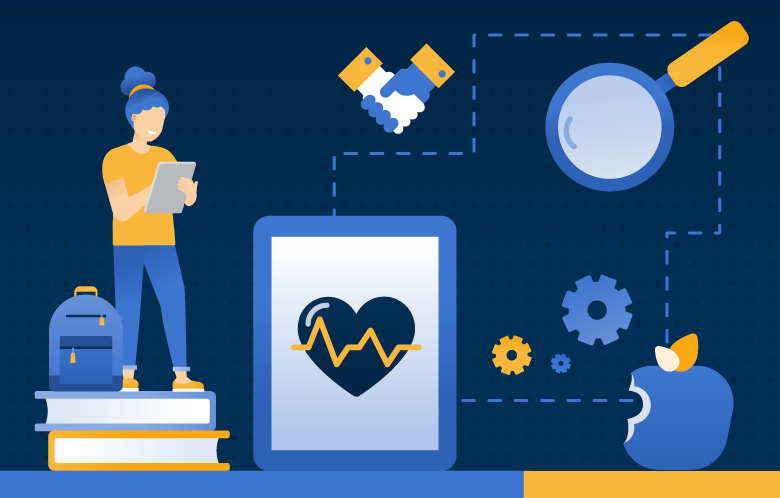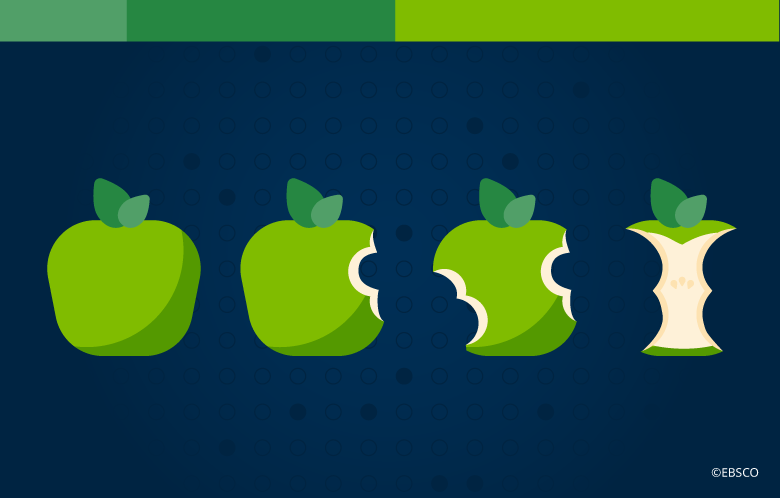To provide students with a well-rounded education, many schools include health literacy in their curriculum. As dynamic spaces that can shape minds (and hearts), school libraries play a vital role in this endeavor. By curating relevant information resources, organizing engaging events and collaborating with experts, school libraries can equip students and other members of the school community with the knowledge and skills they need to make informed decisions about their health and well-being.
Consider these seven strategies:
-
Curate a well-rounded collection of health and wellness resources.
School libraries can offer a diverse range of age-appropriate resources that cover nutrition, mental health, physical fitness, disease prevention and other topics that align with school curriculum requirements. Since print materials on health topics can quickly become out of date, the ideal collection will include digital resources such e-books, a high-quality consumer health database and links to reputable websites.
-
Collaborate with teachers to integrate health literacy into the curriculum.
Librarians can help teachers reinforce health literacy across different areas of study by providing resources and research materials to support classroom learning. This multidisciplinary approach enriches students' understanding of health and its intersections. The CDC’s health literacy website links to ready-made curricula as well as health and science education resources.
-
Form partnerships.
Collaborating with nurses, local healthcare providers, law enforcement agencies and community organizations can also enrich health literacy initiatives in schools. Schools can host health workshops, presentations and guest speakers who can provide students and faculty with firsthand knowledge and insights on various health-related subjects. For example, a dentist could talk to children about the importance of oral health, or a registered dietician could teach kids about healthy eating habits. At the high school level, a drug counselor could share the science behind addiction, or a police officer could discuss the legal aspects of substance abuse and its impact on communities. These partnerships bridge the gap between theory and practice, promoting a deeper understanding of health issues.
-
Organize a health fair.
Beyond traditional information resources, school libraries can initiate special programs or awareness campaigns to actively engage students, faculty, administrators and parents. Health fairs, for instance, offer interactive activities, demonstrations and games that educate and raise awareness about vital health topics. These events not only provide information (and healthy food to sample), but also generate enthusiasm and motivation for maintaining a healthy lifestyle. Don’t forget to leverage partnerships in planning a health fair.
-
Promote reading and research skills.
Being able to evaluate the credibility of online health information and identify medical misinformation, especially on social media, are essential skills. By creating reading lists, recommending books that promote healthy habits, and modeling effective research techniques, school librarians can help students sharpen their critical thinking skills, prepare them for college-level research, and potentially inspire them to pursue health-related careers.
-
Develop visual displays to captivate and educate.
Working with students or teachers, school librarians can create interactive displays using posters, infographics and multimedia presentations that convey essential health information. These displays should be regularly updated to maintain relevance and pique students' curiosity, serving as engaging platforms for health education. LibraryAware offers tools and templates for creating posters, flyers, newsletters, social media and more.
-
Incorporate technology.
School librarians can use educational health and fitness apps, online health quizzes, videos and podcasts to engage students and faculty. Exploring digital platforms that offer health-related courses, games or simulations adds an element of excitement and interactivity to the learning process.
School libraries have the potential to be transformative spaces that nurture healthier minds and bodies. By curating reliable information resources, collaborating with teachers and local subject-matter experts, promoting research skills and embracing technology, school librarians can help all members of the school community develop the knowledge and skills necessary to make informed health-related decisions.



